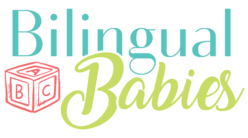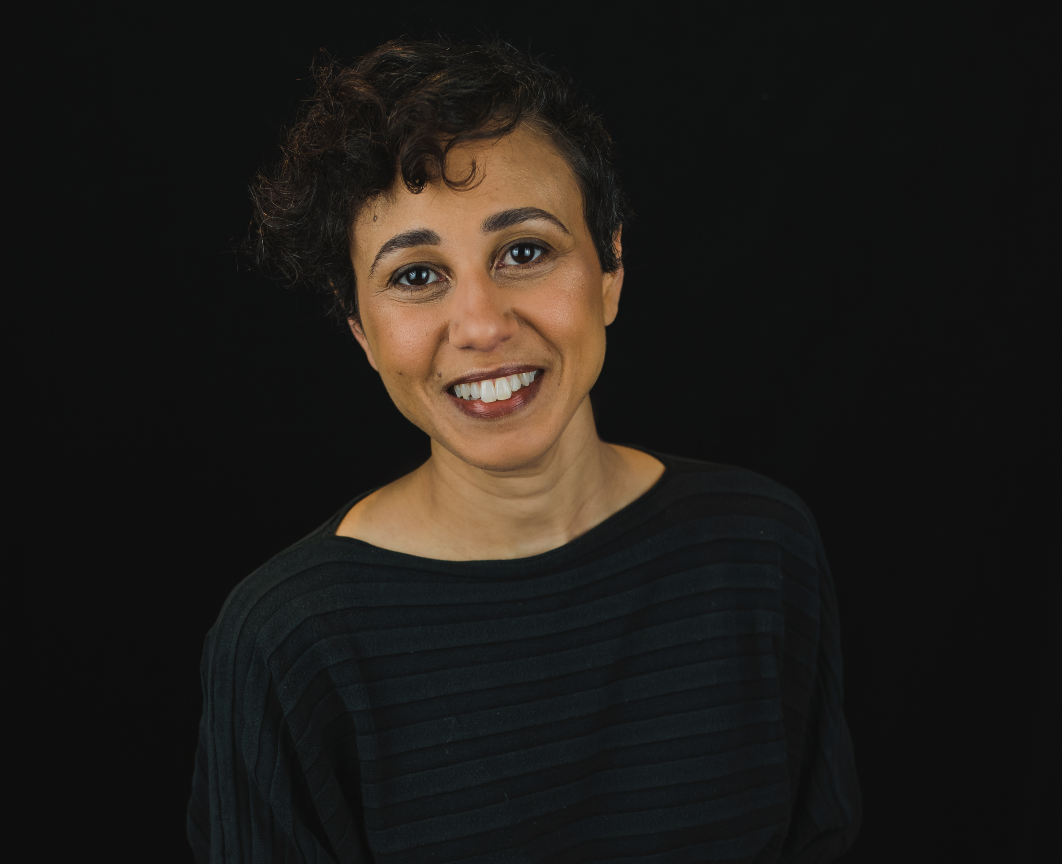Kelly Bron Johnson is the mom of two boys with childhood Apraxia of speech and the author of ‘How To Parent Like An Autistic’. As a linguist, she had the dream of a multilingual family, a dream that would take a bit longer to become reality due to her children’s diagnoses. Promoting her boys’ speech and language(s), Kelly is gradually turning that dream into a reality, encouraging her boys to try out additional languages.
Veronika:
Hi Kelly! Many thanks for taking the time to talk about your bilingual journey today! My first question is: what is your family language situation? Who speaks what to whom?
Kelly:
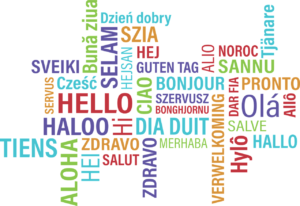 Thanks for having me! Where shall I start…? I had dreams about what our language situation was going to be like, but those dreams did not come true. Let me start with myself: So, I grew up with an English father and a French-Canadian mother. When I went to university, I studied German. My degree was in linguistics, but I had an interest in comparative Germanic languages and Proto-Indo-European languages. And I took two years of Irish. I just love languages!
Thanks for having me! Where shall I start…? I had dreams about what our language situation was going to be like, but those dreams did not come true. Let me start with myself: So, I grew up with an English father and a French-Canadian mother. When I went to university, I studied German. My degree was in linguistics, but I had an interest in comparative Germanic languages and Proto-Indo-European languages. And I took two years of Irish. I just love languages!
Veronika:
That sounds like you do!
Kelly:
Yeah, very weird.
Veronika:
No, not at all.
Kelly:
My husband was born in Ontario. He lived all over Canada and learned French, but he is primarily Anglophone. So, when our son was born, I had big dreams of him being this wonderful multilingual child. We would be speaking English, French, and German. It would be wonderful and we would send him to the Alexander von Humboldt school here in Montreal. It was going to be magical, but instead it ended up being a dream. It didn’t happen.
Veronika:
Why not? What happened instead?
Childhood Apraxia of Speech: A motor speech disorder
Kelly:
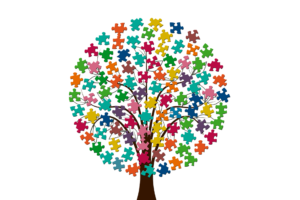 My son is autistic. He has a childhood Apraxia of speech, which is a motor speech disorder, a language disability. It’s lifelong so it’s not something that will just go away. It’s a very severe language disorder where the sounds of the language are processed in the brain, but the motor skills lag behind what they want to say. As you can imagine, it is very frustrating for somebody to know what they want to say in their head and then not have it be able to come out of their mouths. It’s very difficult. Some kids who have an Apraxia can have very, very difficult pronunciation. From the moment that we found out what it was, we knew it was serious. With my background in linguistics I knew we needed to get on to this. So, when he was 18 months old, he started having speech therapy.
My son is autistic. He has a childhood Apraxia of speech, which is a motor speech disorder, a language disability. It’s lifelong so it’s not something that will just go away. It’s a very severe language disorder where the sounds of the language are processed in the brain, but the motor skills lag behind what they want to say. As you can imagine, it is very frustrating for somebody to know what they want to say in their head and then not have it be able to come out of their mouths. It’s very difficult. Some kids who have an Apraxia can have very, very difficult pronunciation. From the moment that we found out what it was, we knew it was serious. With my background in linguistics I knew we needed to get on to this. So, when he was 18 months old, he started having speech therapy.
Veronika:
How old is he now?
Kelly:
He is 11 now. If you hear him talk to you, you would never know that he ever had any sort of language disability. Sometimes he will have an accent, he sounds almost like he’s from Boston or New York. Sometimes it sounds like a British accent. And people wonder, what’s his accent? But it’s not his accent, it’s actually his speech impediment. It’s not his fault. It just happens. The fact that it’s unpredictable is one of the hallmarks of Apraxia. So one minute people with Apraxia can say a long word like ‘monopoly’ just fine and the next minute it comes out all garbled. There’s no predicting it. That’s why it’s very frustrating and very anxiety-inducing for the person who has Apraxia because it’s like you cannot trust your own body to do what it’s supposed to do. So he is our first child.
Veronika:
There is another?
Adding Inuktitut through adopting an indigenous child
Kelly:

(C) Simtropolitan, CC BY-SA 2.5
Yes, about six years after he was born, we adopted an Indigenous child. His family language would have been Inuktitut. So I started taking some Inuktitut lessons, but it’s a very, very difficult language. It’s really not like any other, certainly not like a European language. It functions very differently. And because I don’t have a lot of exposure to Inuktitut, it’s very hard to pick up. So, other than a few little phrases here and there, we’ve not mastered the language yet. He’s five years old now and, like a curious twist of fate, he also got diagnosed with Apraxia. So he also has childhood apraxia of speech and he also has morphosyntax disorder which means the words in his sentences are out of order. So he might make a sentence that comes out completely out of order. The words are all mixed up.
Veronika:
Forgive my ignorance, but how common is Childhood Apraxia of Speech?
Having two children with Apraxia of Speech
Kelly:
I don’t quite remember the numbers. It’s not widely known, I guess, but the fact that I’ve found whole communities online, makes me think that there are quite a few people. For example, there’s a Canadian Childhood Apraxia Association. I think that it might be under-diagnosed. It is hard to find speech therapists who know how to work with it. It’s a very specific kind of disorder. And I think that speech therapists might not get a lot of training or understanding on how to work with Apraxia. It does show up more commonly in people with autism. So, the fact that my eldest son is autistic and is Apraxic is not really a surprise. I was like, how did this happen to me, that I ended up with two?
Veronika:
Yes. That’s why I asked how frequent it is.
Kelly:
I mean, I guess my linguistics degree was useful for something.
Veronika:
That’s true. How did you deal with it? What did you do at home to promote your children’s speech and language?
Language queuing and other speech exercises at home
Kelly:  A lot of very intensive speech therapy. Both of them have had weekly therapy from a young age, and then we’d follow-up at home with a lot of the exercises. One system is really innovative and very helpful, especially with Apraxia. It’s called “language queuing.” It was actually designed by a Montreal speech-language pathologist named Karen Evans. That’s why it’s also known as “Karen’s cues”. You are touching the child’s mouth while you’re speaking to have them learn where they should be putting their tongue or how they should place their lips. The tactile helps; that sensory part, to actually feel the motor muscles that are involved, can help them understand.
A lot of very intensive speech therapy. Both of them have had weekly therapy from a young age, and then we’d follow-up at home with a lot of the exercises. One system is really innovative and very helpful, especially with Apraxia. It’s called “language queuing.” It was actually designed by a Montreal speech-language pathologist named Karen Evans. That’s why it’s also known as “Karen’s cues”. You are touching the child’s mouth while you’re speaking to have them learn where they should be putting their tongue or how they should place their lips. The tactile helps; that sensory part, to actually feel the motor muscles that are involved, can help them understand.
Veronika:
That’s really interesting. Could you see improvements over time?
Kelly:
It’s slow. I think with my eldest it’s been much quicker because he didn’t have the same receptive language deficits that my younger son has. We believe my younger son was exposed to alcohol during the pregnancy so that causes a whole host of problems that we don’t know yet. Anyways he doesn’t always understand everything we’re saying. It’s been difficult and because of that, we’ve stuck to one language at home. We’ve all stuck to English in the house.
Attempting multiple languages… and boosting confidence
Veronika:
Have they ever tried learning another language?
My eldest one was learning French. But he was having a lot of confidence issues with it. Again, the pronunciation, struggling with trying to pronounce the sounds he wanted. With the pandemic, we started homeschooling. Seeing that my son was struggling so much with French, I wanted to give him some confidence that he was capable of learning another language. So I put him in a German class.
Since he was young, despite all the issues, I have always tried to say a few things in German to him. We have some German books, so I read to him. He would laugh because it sounded so funny to him but I could tell, he was still picking up some words. So, as I put him in an online German class, he started to pick it up super quickly and he got his confidence back.
“This is my way of getting around things and making the dream of a bilingual family work”
 So I guess what I’m trying to say is that it’s not that you can’t learn another language. It’s just that it takes work, and it may even be a confidence booster. I found that learning another language has helped him a lot and now he’s saying a few things in German! This is my way of getting around things and making the dream of a bilingual family work nevertheless. It just takes a bit more time and effort. And I have even found that my little one will try to say things in German. Obviously, he says it wrong, and then my older one corrects him. It’s hilarious. It’s just hilarious to hear these conversations with my older son correcting my younger one with his pronunciation in German.
So I guess what I’m trying to say is that it’s not that you can’t learn another language. It’s just that it takes work, and it may even be a confidence booster. I found that learning another language has helped him a lot and now he’s saying a few things in German! This is my way of getting around things and making the dream of a bilingual family work nevertheless. It just takes a bit more time and effort. And I have even found that my little one will try to say things in German. Obviously, he says it wrong, and then my older one corrects him. It’s hilarious. It’s just hilarious to hear these conversations with my older son correcting my younger one with his pronunciation in German.
Veronika:
That’s interesting. So, they’re both meddling in German.
Kelly:
Yes.
Veronika:
Do you plan to keep up German once COVID is over?
Giving it time until the child is emotionally ready
Kelly:
Yeah, as long as he has an interest, we’ll keep going and see where it goes. For my younger son, I’d like him to try as well and then I’d like to encourage him to start learning Inuktitut when he’s ready. He still hasn’t quite accepted that he’s adopted. He’s not bringing that into his identity yet. Normally at the age of five, you start telling them their adoption story and they gradually start to form that identity. He is not quite there yet. We had put him in Inuktitut classes when he was three and he hated it. He absolutely, completely rejected it. So I want to give it time, but still encourage him. For now, we incorporate the Inuit culture by trying to find traditional foods and going to events, well, we used to go to events, but we still have some online events. But the language shall eventually become part of it.
Veronika:
That’s a good approach! There is something else I wanted to ask you about. Do you do anything to promote French in the house? I’ve only been to Montreal once, but it seemed very common for people to be French-English bilingual up there. So, can you get through with just English?
 French as a graduation requirement
French as a graduation requirement
Kelly:
Well, you will not be able to get a good job if you can’t speak French. But because the children have disabilities, we can have an exemption where they don’t have to be at the same level in French or they don’t have to have French to graduate. That is not what I want to happen but at the same time, there is also reality.
Veronika:
Right.
Kelly:
So, my eldest, despite the struggles, he’s still taking French and we’re still doing that, but he’s at a lower grade level. Which means if he wants to graduate high school on time, we’re going to have to get him caught up to his grade level. But I don’t want to stress him and I’m certainly not going to stress about it myself.
Veronika:
That’s the best way to go. Give it time and don’t stress about it. By the way, you said earlier that you tried bilingual in the beginning and then switched to monolingual. Was that based on advice you received from speech pathologists?
From no speech to gradually building up languages at home
Kelly:
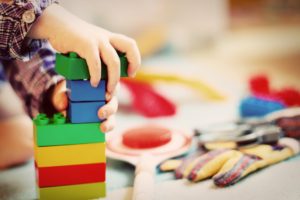 Yes, they did recommend that we stick to one language, especially when my eldest son was not talking at all. He was almost four before he started speaking in a way that anybody else could understand him. He had no speech. So we felt that one language is better than no language. We simply needed speech. So, even though that’s not what I was taught or what I believed in, we did do that. We did simplify it in that sense. We had to have him speak. That’s how severe it was. My youngest one went to a bilingual daycare, so he would come home switching back and forth for quite some time. But now, with the pandemic he’s been home for quite a while. He’ll watch a show. He’ll put the cartoon on sometimes it’s in French, sometimes it’s in English and that’s fine.
Yes, they did recommend that we stick to one language, especially when my eldest son was not talking at all. He was almost four before he started speaking in a way that anybody else could understand him. He had no speech. So we felt that one language is better than no language. We simply needed speech. So, even though that’s not what I was taught or what I believed in, we did do that. We did simplify it in that sense. We had to have him speak. That’s how severe it was. My youngest one went to a bilingual daycare, so he would come home switching back and forth for quite some time. But now, with the pandemic he’s been home for quite a while. He’ll watch a show. He’ll put the cartoon on sometimes it’s in French, sometimes it’s in English and that’s fine.
Veronika:
What would you give as a piece of advice to other parents who are raising bilingual children, and whose children may be on the autism spectrum or children with disabilities in general?
Be patient and follow your own timeline
Kelly:
 My advice for any parent who has a child with a disability is really to be patient and to not worry about the timeline. Because not everything has to be done exactly at the same time as everybody else. I actually wrote a book, it’s called How To Parent Like An Autistic where I talk about some of those things. There’s a lot of pressure, it comes from doctors, it comes from teachers. They say, oh, if the child doesn’t do that at this point, then they’ll never do it. That’s not true, that is not true. Let them be kids because there is time. I do understand there are windows of what they call ‘opportunity’, where it’s going to be easier for sure to pick up certain skills like a language, but it doesn’t mean they will never learn it later on.
My advice for any parent who has a child with a disability is really to be patient and to not worry about the timeline. Because not everything has to be done exactly at the same time as everybody else. I actually wrote a book, it’s called How To Parent Like An Autistic where I talk about some of those things. There’s a lot of pressure, it comes from doctors, it comes from teachers. They say, oh, if the child doesn’t do that at this point, then they’ll never do it. That’s not true, that is not true. Let them be kids because there is time. I do understand there are windows of what they call ‘opportunity’, where it’s going to be easier for sure to pick up certain skills like a language, but it doesn’t mean they will never learn it later on.
It might take longer but it will probably happen if you’re just patient. Especially when you have a kid with a disability, you know you stick out already. You don’t fit in with the other families and people are staring at you. It is a lot to accept and take in. But you can’t compare, you absolutely can’t compare. Your child’s journey, and their timeline, and the way that things go are going to be completely different and you just have to kind of ‘go with the flow’.
Veronika:
That’s right. I think you’re doing an amazing job with that and with gradually working in multiple languages without forcing things. Thank you so much for sharing your story.
Kelly:
It was fun. Thank you!
